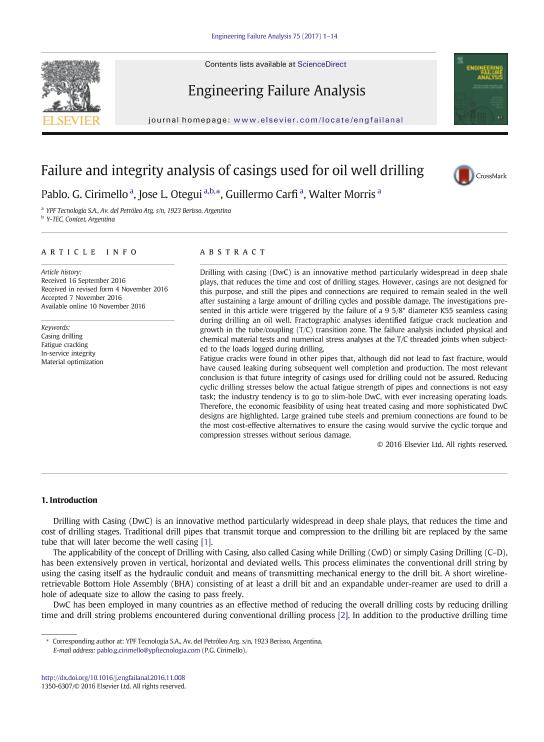Mostrar el registro sencillo del ítem
dc.contributor.author
Cirimello, Pablo. G.
dc.contributor.author
Otegui, Luis Jose

dc.contributor.author
Carfi, Guillermo
dc.contributor.author
Morris, Walter

dc.date.available
2018-05-31T19:19:20Z
dc.date.issued
2017-05
dc.identifier.citation
Cirimello, Pablo. G.; Otegui, Luis Jose; Carfi, Guillermo; Morris, Walter; Failure and integrity analysis of casings used for oil well drilling; Pergamon-Elsevier Science Ltd; Engineering Failure Analysis; 75; 5-2017; 1-14
dc.identifier.issn
1350-6307
dc.identifier.uri
http://hdl.handle.net/11336/46856
dc.description.abstract
Drilling with casing (DwC) is an innovative method particularly widespread in deep shale plays, that reduces the time and cost of drilling stages. However, casings are not designed for this purpose, and still the pipes and connections are required to remain sealed in the well after sustaining a large amount of drilling cycles and possible damage. The investigations presented in this article were triggered by the failure of a 9 5/8″ diameter K55 seamless casing during drilling an oil well. Fractographic analyses identified fatigue crack nucleation and growth in the tube/coupling (T/C) transition zone. The failure analysis included physical and chemical material tests and numerical stress analyses at the T/C threaded joints when subjected to the loads logged during drilling. Fatigue cracks were found in other pipes that, although did not lead to fast fracture, would have caused leaking during subsequent well completion and production. The most relevant conclusion is that future integrity of casings used for drilling could not be assured. Reducing cyclic drilling stresses below the actual fatigue strength of pipes and connections is not easy task; the industry tendency is to go to slim-hole DwC, with ever increasing operating loads. Therefore, the economic feasibility of using heat treated casing and more sophisticated DwC designs are highlighted. Large grained tube steels and premium connections are found to be the most cost-effective alternatives to ensure the casing would survive the cyclic torque and compression stresses without serious damage.
dc.format
application/pdf
dc.language.iso
eng
dc.publisher
Pergamon-Elsevier Science Ltd

dc.rights
info:eu-repo/semantics/openAccess
dc.rights.uri
https://creativecommons.org/licenses/by-nc-sa/2.5/ar/
dc.subject
Casing Drilling
dc.subject
Fatigue Cracking
dc.subject
In-Service Integrity
dc.subject
Material Optimization
dc.subject.classification
Recubrimientos y Películas

dc.subject.classification
Ingeniería de los Materiales

dc.subject.classification
INGENIERÍAS Y TECNOLOGÍAS

dc.title
Failure and integrity analysis of casings used for oil well drilling
dc.type
info:eu-repo/semantics/article
dc.type
info:ar-repo/semantics/artículo
dc.type
info:eu-repo/semantics/publishedVersion
dc.date.updated
2018-05-30T14:27:17Z
dc.journal.volume
75
dc.journal.pagination
1-14
dc.journal.pais
Reino Unido

dc.journal.ciudad
Oxford
dc.description.fil
Fil: Cirimello, Pablo. G.. YPF - Tecnología; Argentina
dc.description.fil
Fil: Otegui, Luis Jose. Consejo Nacional de Investigaciones Científicas y Técnicas; Argentina. YPF - Tecnología; Argentina
dc.description.fil
Fil: Carfi, Guillermo. YPF - Tecnología; Argentina
dc.description.fil
Fil: Morris, Walter. YPF - Tecnología; Argentina
dc.journal.title
Engineering Failure Analysis

dc.relation.alternativeid
info:eu-repo/semantics/altIdentifier/doi/https://dx.doi.org/10.1016/j.engfailanal.2016.11.008
dc.relation.alternativeid
info:eu-repo/semantics/altIdentifier/url/https://www.sciencedirect.com/science/article/pii/S1350630716307889
Archivos asociados
